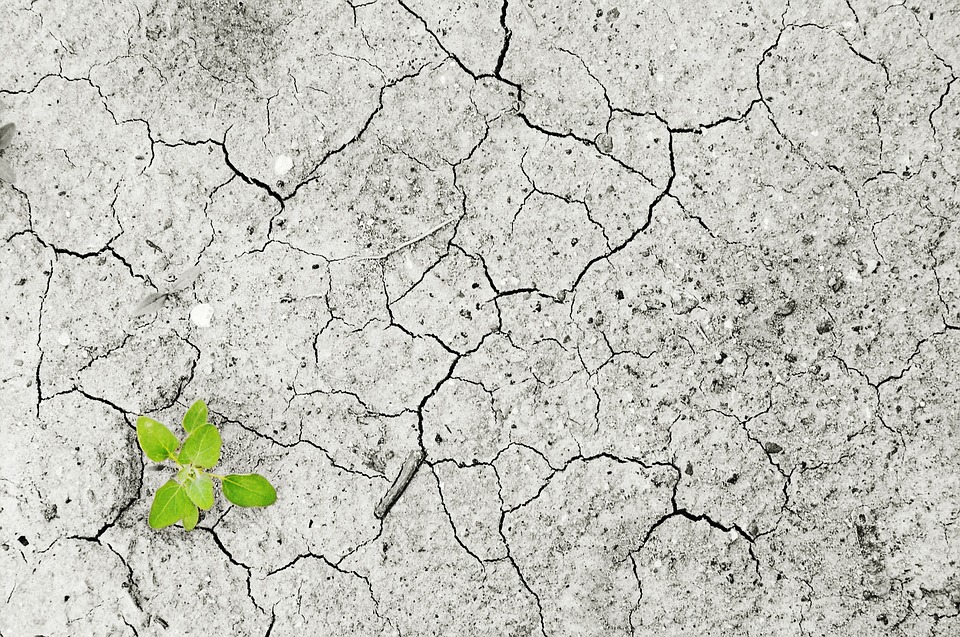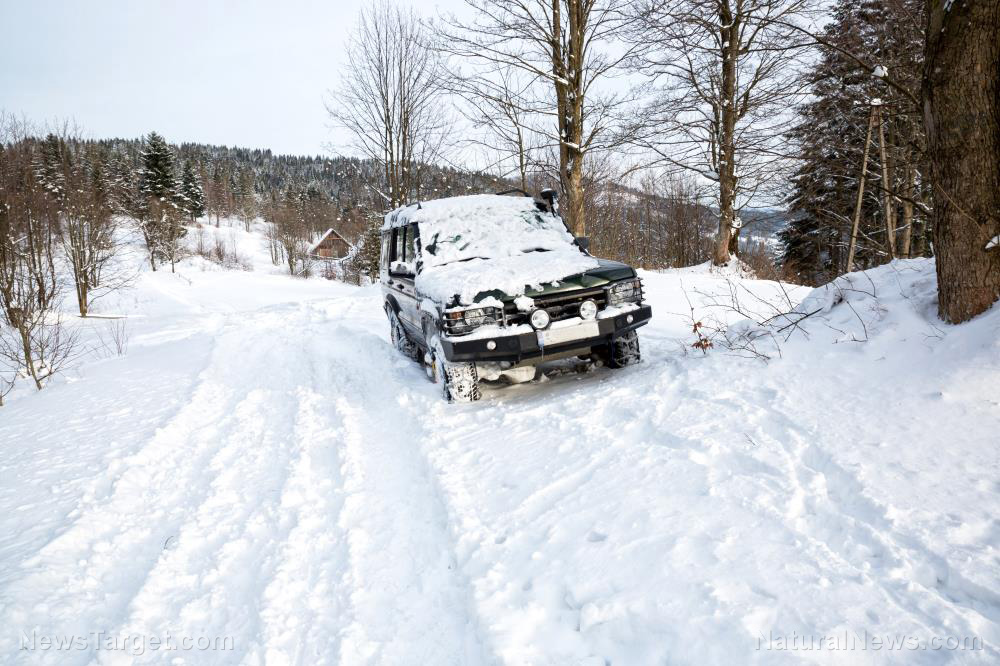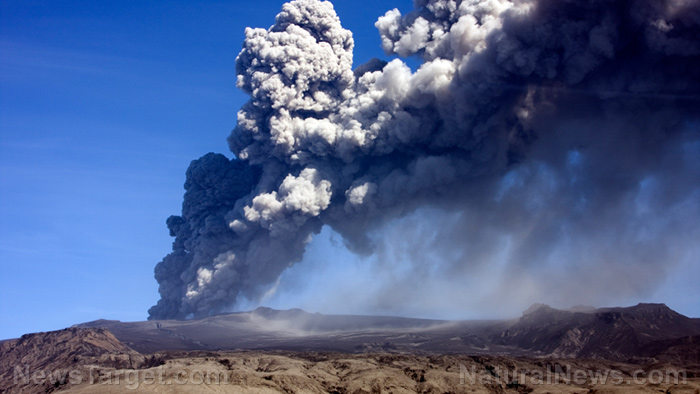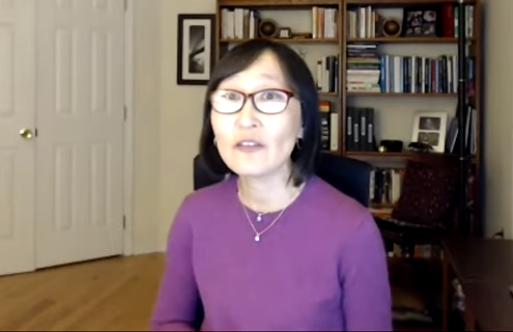Green policies return the world to coal
10/21/2021 / By News Editors

There’s scarcely a place in the modern world that will not be feeling the high cost and discomfort of a shortage of energy supplies and their increasingly soaring prices. Lebanon already is. Due to a shortage of oil, the two power plants that supply 40% of that country’s electricity shut down. There is no electricity in Lebanon and will not be any for some days.
(Article by Clarice Feldman republished from AmericanThinker.com)
It’s an extreme case, but even the United Kingdom, the EU, the U.S., and China are running up against diminishing ability to obtain the necessary energy supplies to keep things running smoothly. Some of the shortages are due to accidents, like the cutting of an undersea cable to the UK, but most are due to green policies and stupid political choices, ironically shutting down oil and gas-fired power plants and fossil fuel exploitation and transport at the demand of the greens, who grossly overestimate both global warming and the ability of air, sun and water to take their place. Ironically, this means coal — the dirtiest possible fuel — is back in huge demand.
Despite an import ban on Australian coal, China relented and has begun unloading Australian coal because of an extreme power crunch. Coal is now in demand in Europe as gas prices soar and the EU’s energy policies are in large responsible:
The ideological split will drive a wedge between the European Union, a long-time champion of a coal phaseout, and corporate interests as market conditions favour gas-to-coal switching. The switching ratio has slid in coal’s favour in the last weeks of June 2021 and judging by the current futures structure, it will stay in place until at least Q2-2022 [snip] Given the natural limitations to further coal utilization, in Germany the main interaction in the upcoming weeks will be between coal and wind. Coal-fired electricity generation rose to multi-year highs in the first weeks of September when every single day saw wind generation only a fraction of its usual strength and speed. Now, the situation has changed somewhat as wind started blowing again, dropping hard coal generation to an average generation rate of 7.5-8 GWh, still some 30-35% higher than at this time of the year in 2020. Yet still, Germany’s travails are far from over, especially with December looming large on the horizon. According to preliminary plans, that month alone three nuclear plants will stop operating in Germany — Brokdorf, Grohnde and Gundremmingen — with a combined (non-intermittent) capacity of 4 GW, representing the penultimate wave of nuclear phase-out closures before 2022 sees the last 3 reactors decommissioned. Such substantial capacity would need to be replaced with either coal or gas, with profitability skewed overwhelmingly towards the former. [snip]
The current coal demand surge should force the European Union to reconsider its position on coal — as polluting as it might be, it could still help alleviate energy crunches across Europe when the situation demands it. As things stand today, the upcoming four years would see at least seven countries phasing out coal: Portugal (2021), France (2022), UK (2024), Hungary, Italy, Ireland and Greece (all 2025). As Europe has seen nine consecutive year-on-year increases in aggregate coal burns, perhaps more switching flexibility and less bans could still be the way forward.
It’s no secret that the cleanest most reliable fuel – nuclear — was murdered by the greens. Then natural gas, the second cleanest, became their target, so now many places are desperate for coal, the dirtiest option.
Noah Rothman agrees with me — the greens are largely responsible for the present energy crunch and its consequences:
The intended consequence of these [Biden] policies was to create artificial energy scarcity and incentivize alternative fuel producers to enter the marketplace. “If you restrict the supply (of oil and gas), you alter the market and you create a better environment for more sustainable fuels,” New York University professor Max Sarinsky told the Associated Press. This was all part of the plan, to the extent there was a plan.
So, yes, there’s a lot of blame to go around if what Friedman forecasts to be a dark, cold, and scary winter materializes. No small share of that blame should be apportioned out to the central planners who sought to kneecap the existing energy market in favor of an insufficient alternative.
Was there any point to the war on fossil fuels? Probably not. Judith Curry, one of the most reliable climate researchers, explains how even the Intergovernmental Panel on Climate Change (IPCC) admits finally that the dire climate models off of which they were working were in substantial error. The latest report (AR6) from the IPCC indicates previous models were predicting a hotter climate than warranted.
A substantial number of the CMIP6 models are running way too hot, which has been noted in many publications. In its projections of 21st century global mean surface temperatures, the AR6 provides ‘constrained’ projections (including climate models with reasonable values of climate sensitivity that reasonably simulate the 20th century). [snip] With regards to fitness for purpose of global/regional climate models for climate adaptation decision making, an excellent summary is provided by a team of scientists from the Earth Institute and Red Cross Climate Center of Columbia University:

“Climate model projections are able to capture many aspects of the climate system and so can be relied upon to guide mitigation plans and broad adaptation strategies, but the use of these models to guide local, practical adaptation actions is unwarranted. Climate models are unable to represent future conditions at the degree of spatial, temporal, and probabilistic precision with which projections are often provided which gives a false impression of confidence to users of climate change information.” (Nissan et al.)
GCMs [Global Climate Models] clearly have an important role to play particularly in scientific research. However, driven by the urgent needs of policy makers, the advancement of climate science is arguably being slowed by the focus of resources on this one path of climate modeling. The numerous problems with GCMs, and concerns that these problems will not be addressed in the near future given the current development path, suggest that alternative frameworks should be explored. This is particularly important for the science-policy interface.
Worldwide fuel shortages and rising costs aren’t the only concerns this winter, and they aren’t the only concerns of China, whose aggressive air flights near Taiwan and marine actions in the South China Sea have unnerved many.
The CIA has been secretly training Taiwan forces to respond to any Chinese attacks. Marines and Special Forces have been training Taiwan troops for a year.
About two dozen members of U.S. special-operations and support troops are conducting training for small units of Taiwan’s ground forces, the officials said. The U.S. Marines are working with local maritime forces on small-boat training. The American forces have been operating in Taiwan for at least a year, the officials said.
The U.S. special-operations deployment is a sign of concern within the Pentagon over Taiwan’s tactical capabilities in light of Beijing’s years long military buildup and recent threatening moves against the island.
Japan seems to be back constructing carriers to defend itself and its allies.
The situation at the top of China and the U.S. makes these aggressions very fraught with danger to the world. Xi’s efforts to deny the country’s oligarchs power have melted down its markets. Its power shortages have compelled Xi to order energy diverted from factory production to homes this winter. And this is having a ripple effect throughout the economically globalized world.
The China power crunch also risks heaping further pressure on global supply chains by pushing up prices for raw materials and essential components.
“Global markets will feel the pinch of a shortage of supply from textiles, toys to machine parts,” wrote Ting Lu, chief China economist at Nomura Holdings, in a note to clients on Monday. He added that the resulting supply shock will likely further push up global inflation, especially in developed markets such as the U.S. The power curbs have hit parts of China’s manufacturing bases, including those that produce semiconductor-related goods. A global shortage of semiconductors this year has already hit car makers and other industries.
Steve Cooke, managing director of Cre8tive Brand Ideas Ltd., a Solihull, England-based distributor of promotional merchandise such as branded bags, clothing, pens and computer accessories, said he relies on suppliers who source 80% of their products from China. Already this year, rising freight costs and supply-chain bottlenecks have pushed up his costs and lengthened delivery times for his customers. He said he expects those pressures to intensify as the power crunch squeezes production.
“We rely so much on China, it’s incredible,” he said.
Over at Gates of Vienna, H. Numan has a well-considered essay on why the current situation is so dangerous to the world: China has no combat veterans and its leadership is largely people who paid for their positions. Its military equipment is just adequate, mostly reverse-engineered copies of stuff developed elsewhere.
The worldwide pandemic was caused by the CCP. The coal shortage is entirely Chinese. The CCP embargoed Australia when it asked questions about what China would do to compensate for the pandemic. They hoped to beat Australia into submission. It didn’t work, and now major industries and half the country face enormous blackouts. The winter (-20 C) has yet to come. Incidentally, the embargo also covers Australian grain. Really clever, when you already have severe food shortages.
The Chinese long-term policy is equally bad. The Belt and Road Initiative proved to be a very costly failure. For two very obvious reasons: shipping goods by rail isn’t going to replace shipping by sea. One single container ship can carry more freight than a rail link between Beijing and Rotterdam can carry in a full year, at a much lower cost. The cutthroat negotiations and mafia tactics warned some nations not to fall for it. Sri Lanka lost a port they had build by the Chinese to the Chinese when they defaulted on payment. Piraeus in Greece and the port of Darwin are/were Chinese owned. Piraeus still is, Darwin was canceled. They even tried to buy the port of Rotterdam.
Right now China is in the same position as Germany was before starting WW2. Not enough money, and too many ambitious goals that cannot be met. There are more than enough grudges from the past that only need a little kindling before becoming a raging fire. [snip]
The problem with salami slicing is that you do get what you want, but it is very expensive and takes a very long time. And you run the real risk of losing it all. Germany sliced itself into Austria, Czechoslovakia, and lost everything when they tried to slice the Danzig corridor.
China sort of has the same problems. And it ran out of peaceful options. We’re in a very dangerous situation with Chinese characteristics.
In Europe, only tiny Lithuania has taken on China, which may force the EU’s hand on Taiwan.
On Tuesday, the 27 EU leaders gathered for a dinner that involved a discussion on EU-China relations, in which Lithuania’s President Gitanas Naus?da called on his peers to send a message of “unity” in the face of China. The dinner ended up with what Borrell called “a very interesting debate.”
“There is a big bipolarity between China and U.S. on one side, and on the other side there’s a multipolarity of actors,” he said. “And Europeans have to act; Europeans have to create a common strategic culture to share the challenges they’re facing.”
While the EU’s strategic compass is still being drawn up, one thing is clear: In facing off against Beijing, Lithuania — population 2.8 million — has pushed the subject of Taiwan and relations with China more prominently onto the EU’s agenda in a way that leaders in Beijing and many European capitals have been avoiding for years.
And, for the moment at least, Vilnius shows no signs of backing down.
As for the U.S. Stephen Bryen details President Biden’s puzzling mumbles about his conversation with Xi on Taiwan.
President Joe Biden, on Tuesday, October 5th, said that he had spoken to Chinese President Xi Jinping and both of them had agreed to “stick to” the “Taiwan agreement.”
The only known recent conversation between Biden and Xi took place on September 9th. The “read out” provided by the White House says nothing either about Taiwan or the Taiwan agreement. So we are left rather in the dark about what transpired. Even so, given Mr. Biden’s statement about the “Taiwan agreement,” his statement is extremely worrisome.
The nature of that conversation and Mr. Biden’s description was not lost on the Taiwanese or the Japanese, so much so that the State Department moved immediately to clarify its meaning to Taiwan’s President. That would not have been necessary if the State Department was not alarmed by what President Biden said.
Japan also announced that it would come to Taiwan’s aid if Taiwan was attacked. [snip] Mr. Biden has to be put straight on U.S. policy. He should also be clear in speaking to the Chinese that their incursions by air and sea around Taiwan are unacceptable and will be met firmly by counter action by the United States. If Mr. Biden fails to do that, it will cause major problems for America’s posture in east Asia and will be damaging not only to Taiwan, but also to Japan and other U.S. friends in the region. In fact, if we do not deter China, the risk of war escalates.
Greg Gutfeld has a point. Watching Biden on energy policies and relations with China, Biden is a unifier, ”We all think he’s nuts.”
Read more at: AmericanThinker.com
Tagged Under: big government, Climate, coal, Collapse, electricity, energy, energy supply, environment, global supply chain, green energy, green policies, market crash, national security, power





















